Are Israel and Hezbollah about to enter into an all-out war?
As Israel and Hezbollah face off with full vengeance in their sights, this is what we know about the threat of another full-scale war in the Middle East.
World
Don't miss out on the headlines from World. Followed categories will be added to My News.
Iran’s ambassador to the United Nations has warned Israel “crossed the red line” after its recent attacks in Lebanon and said Tehran was exercising “maximum restraint”.
Israeli fighter jets unleashed a furious and targeted attack on Beirut on Friday, killing two top Hezbollah leaders and several other commanders just days after a series of booby-trapped pagers and walkie-talkies were detonated, killing more than 30 and injuring almost 3000 people.
Iran’s ambassador to Lebanon, Mojtaba Amani, was among those wounded.
Mr Iravani told the UN his country would “punish” the perpetrators.
Hezbollah has confirmed one of its top commanders, Ibrahim Aqil, was killed in Beirut on Friday, during Israel’s third attack on the Lebanese capital in recent months.
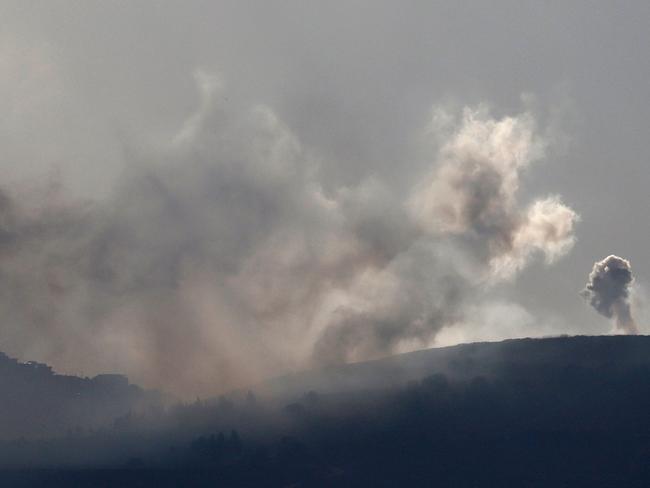
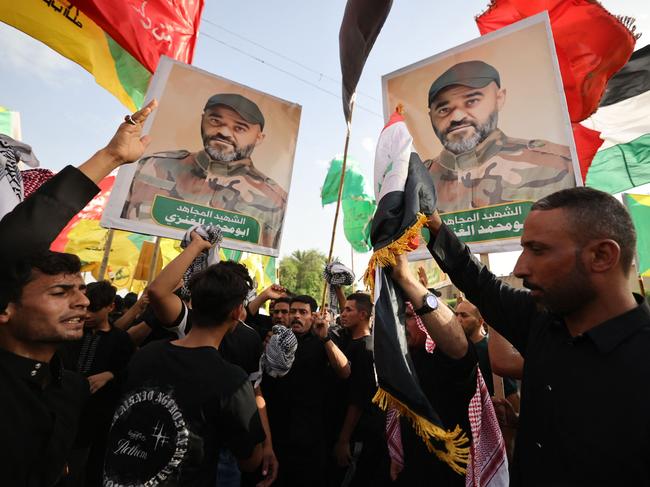
The Lebanese health ministry said a further 66 were injured during the strike.
Israeli Defence Force Chief of Staff Lieutenant General Herzi Halevi said in a statement to media that the strike was carried out on a known Hezbollah stronghold due to intelligence which showed the commanders were planning a terrorist attack.
Hezbollah’s deputy chief Naim Qassem said “we are ready to face all military possibilities” in a grim message directed towards Israel.
“Threats will not stop us … We are ready to face all military possibilities,” he said.
Hezbollah has traded near-daily cross-border fire with Israeli forces throughout the Gaza war, in a campaign Hezbollah says is in support of Palestinian ally Hamas.
The surge in violence has added fuel to fears that an all-out war is imminent. Here’s what we know.
HOW DO THE ISRAELI STRIKES IMPACT HEZBOLLAH?
Hezbollah was in turmoil after Israel took out two leaders of its elite operations unit in a strike on a command meeting in a Beirut stronghold that Lebanese authorities said killed 31 people.
Lebanese Health Minister Firass Abiad said three children were among the dead in Friday’s strike on an underground meeting room, which left a huge crater in a densely populated neighbourhood of the capital’s southern suburbs.
Israel said the strike killed the head of Hezbollah’s elite Radwan Force, Ibrahim Aqil, and several other commanders.
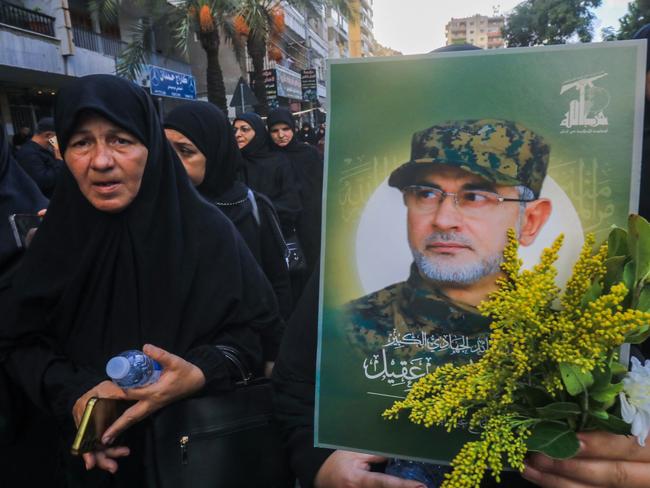
Abiad said emergency services worked “through the night” to recover dead and wounded from the debris, adding that “a residential building collapsed on top of occupants” after the Israeli attack.
The Radwan Force has spearheaded Hezbollah’s ground operations, and Israel has repeatedly demanded through international mediators that its fighters be pushed back from the border.
Coming hot on the heels of sabotage attacks on communications devices this week that killed 37 people in Hezbollah strongholds, the strike raised new questions about the Iran-backed group’s security arrangements and dealt a heavy blow to its fighters’ morale.
Hezbollah said a second senior commander was also killed, naming him as Ahmed Mahmud Wahbi, head of the group’s operations against Israel from the onset of the Gaza war in October until the start of this year.
Confirming the death of Aqil, who was wanted by the United States for involvement in the 1983 bombing of the US embassy in Beirut, Hezbollah hailed him as “one of its great leaders”.
It was the second Israeli strike on the Hezbollah military leadership since the start of the Gaza war.
An Israeli strike on Beirut in July killed Fuad Shukr, a top operations chief for the movement.
It also followed sabotage attacks on pagers and two-way radios used by Hezbollah on Tuesday and Wednesday, which killed 37 people and raised fears of a wider war.
Stephane Dujarric, spokesman for UN Secretary-General Antonio Guterres, said the world body was “very concerned about the heightened escalation” and called for “maximum restraint” from all sides.
The Israeli military said it conducted a “targeted strike” against Aqil, which a source close to Hezbollah said killed a total of 16 Radwan Force members.
“The command of the Radwan Force was meeting in the basement of the building,” the source said.
DO THE ISRAELI STRIKES MEAN THERE WILL BE ALL OUT WAR?
The attacks on hand-held communication devices used by Hezbollah members across the country and in Syria last week has analysts worried.
They say this latest strike has raised the stakes in the decades-old conflict between the two sides.
In a statement shortly after the attacks, Hezbollah said it held the “Israeli enemy fully responsible,” adding that Israel “will certainly receive its just punishment for this sinful aggression”.
Speaking to Israeli troops on Wednesday, Israeli Defense Minister Yoav Gallant said “we are at the start of a new phase in the war — it requires courage, determination and perseverance.”
While making no mention of the exploding devices, he praised the work of Israel’s army and security agencies, saying “the results are very impressive.”
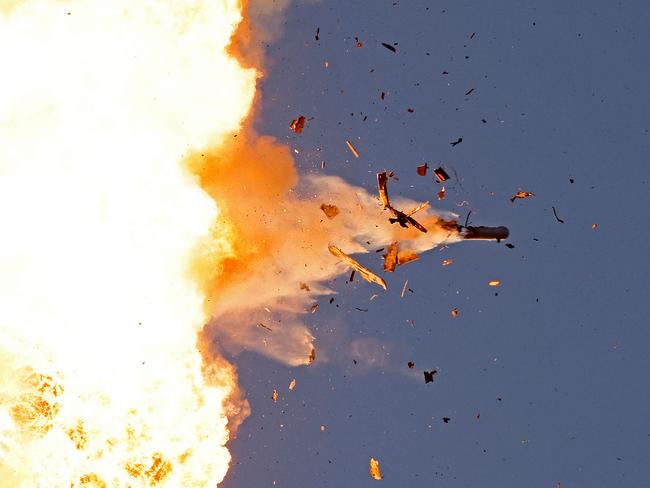
Hezbollah launched over 100 rockets into northern Israel on Sunday in response to ramped-up Israeli strikes that have killed dozens of people in Beirut on Friday.
That barrage killed at least 45 people, including one of Hezbollah’s top leaders as well as women and children. The militant group was already reeling from the dual-wave of blasts on pagers and walkie-talkies earlier in the week.
Egypt’s foreign minister said he feared an all-out regional war in light of the intensified fighting between Israel and Hezbollah, saying the escalation “negatively impacted” a Gaza truce deal.
“There is great concern about … the possibility of an escalation in the region leading to an all-out regional war,” Badr Abdelatty said.
WHAT DOES THE LATEST EXCHANGE OF FIRE MEAN FOR PEACE TALKS?
Hezbollah’s deputy chief Naim Qassem said only a ceasefire in Gaza would put a stop to the group’s cross-border attacks, warning that “the Israeli military solution increases the dilemma for Israel and the residents of the north” of the country.
The European Union also renewed its call for an “urgent” ceasefire this week.
“The European Union is extremely concerned about an escalation in Lebanon after the attacks Friday in Beirut,” EU foreign policy chief Josep Borrell said.
“Civilians on both sides are paying a high price. They will also be the ones suffering once against the most in a full-blown war that must be averted, including by renewed intense diplomatic mediation efforts.”

United Nations Secretary-General Antonio Guterres said it was “clear” neither side of the war in Gaza was interested in a halt to fighting.
“It is for me clear that both sides are not interested in a ceasefire. And that is a tragedy, because this is a war that must stop,” he said.
WILL CRISIS IN LEBANON SPARK ALL OUT WAR BETWEEN ISRAEL AND IRAN?
Middle East tensions have soared since Iran-backed Palestinian militant group Hamas attacked Israel on October 7, sparking war in Gaza and drawing in Iranian allies around the region.
The tensions have intensified in recent days as the focus of Israel’s firepower has shifted north to the Lebanon border where its troops have been battling Iran-backed militant group Hezbollah.
An Israeli air strike on Hezbollah’s Beirut stronghold on Friday killed 31 people, including two of its top commanders, Lebanese authorities said, hot on the heels of deadly sabotage attacks on the group’s communications including pagers and walkie talkies, earlier this week.
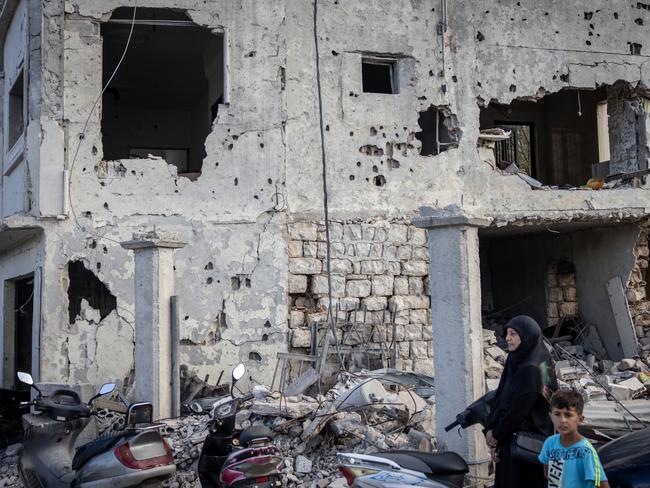
In late July, Israel escalated the tensions when it killed Hezbollah commander Fuad Shukr in Beirut and Hamas’s political leader Ismail Haniyeh in Tehran almost simultaneously.
Many expected that those killings might trigger a wider regional war, however the exchange of fire between Hezbollah and Israel in late August did not escalate into a full-blown war.
However analysts say these latest attacks may force the that escalated retaliation.
WHAT WILL IRAN DO NEXT?
Iran has unveiled a new ballistic missile and an upgraded one-way attack drone at a military parade on the weekend, state media said, amid soaring regional tensions and allegations of arming Russia.
Iran stands accused by Western governments of supplying both drones and missiles to Russia for use in its war with Ukraine, a charge it has repeatedly denied.
The solid-fuel Jihad missile was designed and manufactured by the aerospace arm of Iran’s Revolutionary Guards and has an operational range of 1000km, state news agency IRNA said.
The Shahed-136B drone is an upgraded version of the Shahed-136, with new features and an operational range of more than 4000km, it added.
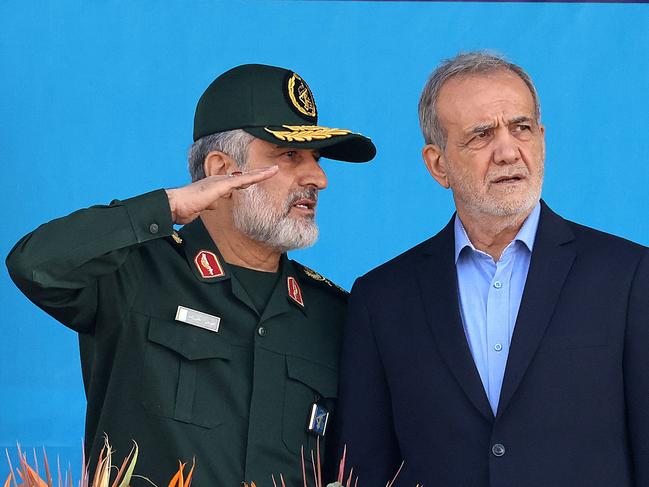
New President Masoud Pezeshkian attended the annual parade in Tehran, commemorating the 1980-88 war with Saddam Hussein’s Iraq.
“Today, our defensive and deterrent capabilities have grown so much that no demon even thinks about any aggression towards our dear Iran,” he said.
“With unity and cohesion among Islamic countries … we can put in its place the bloodthirsty, genocidal usurper Israel, which shows no mercy to anyone, women or children, old or young.”
Supreme Leader Ayatollah Ali Khamenei delivered a similar tirade against Israel to delegates to an annual meeting of Muslim clerics hosted by Iran, calling on Islamic countries to “completely cut off their economic relations” with Israel and “weaken political ties.”
“This inner strength can eliminate the Zionist regime, this malignant cancerous tumour, from the heart of the Islamic community in Palestine and get rid of US domination and coercive interference in the region,” he said.
WHAT DOES IRAN’S ARSENAL LOOKS LIKE?
WHAT DOES ISRAEL’S IRON DOME LOOK LIKE?
WHEN DID LEBANON ATTACK ISRAEL?
The tensions between Lebanon and Israel started at the beginning of the Israeli state in 1948. Lebanese forces, in an alliance with other Arab nations, fought the setting up of the Jewish state, which occurred at the end of the British rule of Palestine.
The war raged for a year, before a peace deal in 1949. As many as 100,000 Palestinians fled to Lebanon around that time. Decades of tensions have followed as the Palestinian Liberation Organisation (PLO) moved its base to Lebanon.
WHAT IS AUSTRALIA’S TRAVEL ADVICE FOR LEBANON?
Australians in Lebanon have been told to “leave immediately while commercial flights remain available” as the latest Israeli attacks on Hezbollah fuel fears for all-out war.
The Australian Government’s updated its advice on the Smart Traveller site for Lebanon on Saturday.
“Australians in Lebanon should leave immediately while commercial flights remain available. Some airlines have postponed or cancelled some flights,” the updated advice stated.
“Further flight cancellations and disruptions could occur with little or no notice. You should take the first available flight and not wait for a preferred route.
“Beirut airport could close, and you may be unable to leave for an extended period. Airlines may cancel more flights or set high ticket prices for any remaining flights. There may also be other travel disruptions.
“The Australian Government may not be able to assist you to leave in such circumstances.”
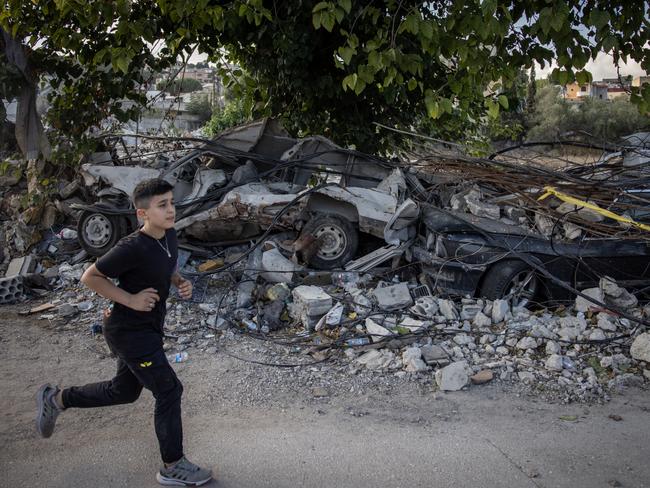
While the government had been advising against travel to Lebanon since October 2023 due to the volatile security situation, it highlighted the risk of the security situation deteriorating further.
“The security situation could continue to deteriorate rapidly throughout Lebanon,” it said. “Air strikes have occurred, including in Beirut, and these may continue. Several thousand electronic devices exploded in Lebanon on 17 and 18 September. This resulted in deaths and serious injuries. Hospitals are treating high numbers of casualties, and some may be overwhelmed.”
Australian Prime Minister Anthony Albanese also appealed to Australians to leave Lebanon when he spoke to media after a meeting with US President Joe Biden on Saturday. Mr Albanese warned the situation in Lebanon could become “more difficult”.
“We have been saying this for many months now. People should take the opportunity to get on a commercial plane and come back to Australia,” he said on Saturday.
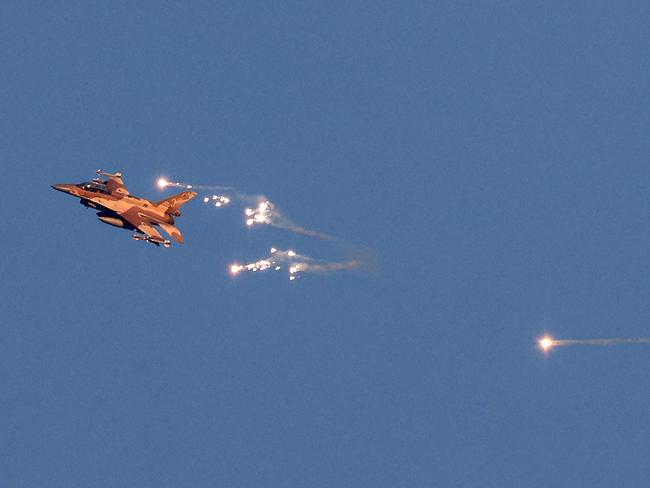
The Smart Traveller advice urged those Australians who chose not to leave while commercial flights were operating, to be prepared to shelter in place for an extended period.
“Make sure you have enough supplies including food, water, medicine, radio, torches and batteries. Know where your identity documents are, including your passport,” it said.
“Terrorist attacks could occur anytime and anywhere, including in Beirut.”
It also urged Australians to register with the Department of Foreign Affairs and Trade’s crisis registration portal, and to keep registration details up to date.
WHAT IS AUSTRALIA’S TRAVEL ADVICE FOR IRAN?
Iran used to be a stop over on the way to Europe for Australians in the 1970s but it is definitely a no-go zone now.
University of Melbourne academic Kylie Moore-Gilbert was jailed in Iran for 804 days on trumped up spying charges before she was released in November 2020.
DFAT continues to list Iran as a “do not travel” country.
“Terrorist attacks could happen anywhere in Iran, including Tehran or other locations frequented by foreigners and tourists,” the Smart Traveller website said. ‘Regional tensions are high, and the security environment could deteriorate with little or no notice.”
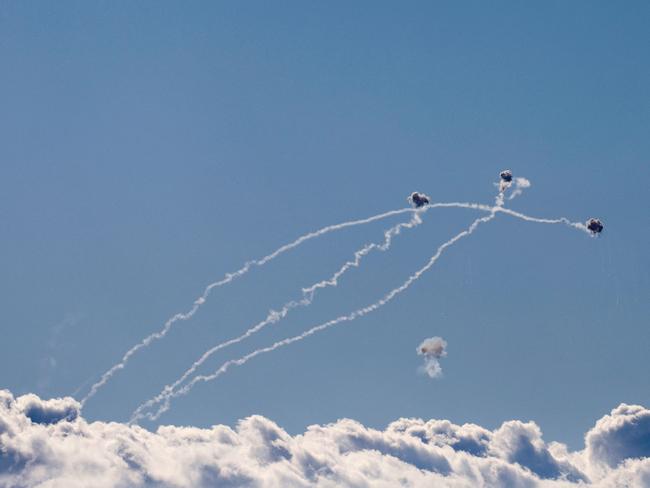
WHY DID ISRAEL BECOME INVOLVED IN LEBANON’S CIVIL WAR?
The Lebanese Civil War started in 1975 as conflict between the Maronite Christian groups, Sunni Muslims and Shia Muslims reached breaking point.
The Christian groups had been in positions of power following French rule of Lebanon, but the migration of Palestinian Muslims into Lebanon following the creation of the Israel state changed the country’s demographics.
Israel supported the South Lebanese Army in 1978 when it was fighting for the rights of minority Christian groups.
The conflict widened in 1982 when Israeli forces, following a series of attacks on its border, invaded southern Lebanon, with forces reaching Beirut.
The war began in June 1982, but the United States brokered a peace deal in August that year. A peace treaty agreed in 1983 failed when the Lebanese Army collapsed, leading to a wider civil war as former soldiers splintered into militias. A peace deal disarmed Lebanese militias in 1990, except for Hezbollah.
IS GOLAN HEIGHTS IN ISRAEL OR PALESTINE?
Israel has controlled the Golan Heights since the Six-Day War in 1967.
They captured the territory in what was previously the south west corner of Syria, along with Old Jerusalem city and the Gaza Strip.
Golan Heights is bordered by the Sea of Galilee and was considered a strategic point.
Israel annexed the area in 1981.
WHERE IS HEZBOLLAH LOCATED IN LEBANON?
Hezbollah, which is supplied with weapons, logistics and money by Iran, controls major parts of Lebanon’s southern border with Israel.
It has used that base to carry out terror attacks for decades, as well as rocket blasts into Israeli territory.
The group has a power base among Sunni Muslims in parts of Beirut.
It has set up a political party in Lebanon and provides cash handouts to locals to garner support.
It’s backer, Iran, are Shia Muslims, but they have put aside that difference because of their attempts to destabilise Israel.
WHAT WAS ISRAEL BEFORE 1948?
The land where Israel was created was formerly part of the Ottoman Empire, which collapsed after its defeat in WWI.
Britain ruled the area until 1947 when the United Nations declared it would become a Jewish state.
However, the boundaries were not clearly defined and have been disputed for decades, leading to bloodshed and ongoing tensions.
Israel had a population surge following the fall of the Soviet Union, with Russian Jews adding at least one million people to its population of 10 million.
More Coverage
Originally published as Are Israel and Hezbollah about to enter into an all-out war?




